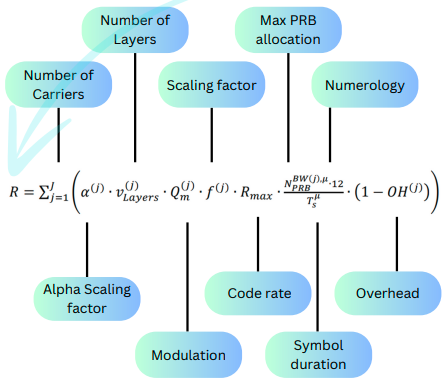5G Peak Data Rate (Throughput) is the highest data rate a cell achieves in ideal radio conditions, fully utilizing all available resources without error, measured in bits per second (bps).
-
It is measured in downlink (DL) and uplink (UL) with TDD (Time Division Duplex) or FDD (Frequency Division Duplex) modes.
-
Efficient use of Spectrum and optimal radio conditions are crucial for maximizing data rates.
-
Factors impacting data rates:-
- Modulation: Max 256QAM
- Overhead (OH): Varies by frequency
- J (number of carriers aggregated): Max 16
- f (scaling factor: mismatch in BB/RF): 1 (no mismatch)
- Coding rate: 0.93 (varies by error correction mechanism)
- Alpha (DL/UL resource proportion): 1 (FDD) and 0.76 (TDD)
- PRB (Physical Resource Block) varies by frequency range & bandwidth
- OFDM symbol duration and TDD frame structures influence performance
Understanding these factors helps optimize the potential of 5G networks for superior data rates and connectivity.
(Ref: ITU)

What peak data rates can be achieved in 5G (by Rahul Kaundal).pdf (2.2 MB)